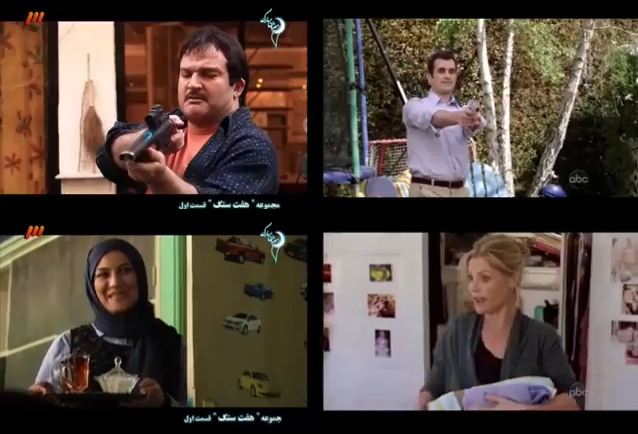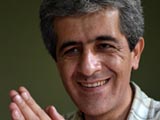“Modern Family”: Iranian, Islamic
by Yaghoub Yadali and translated by Parvaneh Torkamani / July 25, 2014 / No comments
On copying American TV in Iran, in spite of all ethics.

Iran's 'Haft Sang' (left) seems to be a shot-by-shot recreation of the US television show 'Modern Family.' Photos: Youtube.
These days the series Haft Sang (Seven Stones) is broadcast on channel three of Iranian television. It’s unbelievably similar to the American series Modern Family and much of the dialogue, even the camera movements, frame size, and directing style are copied exactly, without a single mention of having the creators of Modern Family‘s permission.

- “Enemy…terrorism…nuclear bomb…war.” These words are often used by American media to describe Iran. The image the media presents is often hazy, incomplete, and distorted. The political and military aspects of my country are covered mainly in a negative light.
- In Under Eastern Eyes (I have adopted the name from the novel Under Western Eyes by Joseph Conrad), I will write about those topics which American media either cannot or does not want to talk about. The emphasis will be on social and cultural aspects of Iran although, out of necessity, I will talk about politics, despite my despair.

- Yaghoub Yadali, born in 1970, is a writer and television director. His first work of fiction, the short-story collection Sketches in the Garden, was published in 1997. It was followed in 2001 by Probability of Merriment and Mooning, which was named book of the year by the Writers and Critics Award. His first novel, The Rituals of Restlessness, won the 2004 Golshiri Foundation Award for the best novel of the year and was named as one of the ten best novels of the decade by the Press Critics Award. He has also published many articles and reviews of literature and cinema in newspapers and magazines in Iran.
On the other hand, the creators of Haft Sang have tried to turn the American ‘Modern Family’ into an Islamic Iranian family. For example, in the American version of the show, a same-sex couple adopts a child, a choice that leads to many funny adventures. The Iranian version has turned this family into an un-cute heterosexual couple who adopt a child. The result is many boring and unfunny adventures.
Copyright laws aren’t honored in Iran, but Iranian television doesn’t allow the broadcasting of American shows because it sees them as a “cultural attack” that teaches bad things and leads to deviation from the ideals of the Islamic Revolution. Now, what happens when writers and directors copy a show from a country that is called “the great Satan?” Haven’t the managers of Iranian television noticed this situation? Or do they know about it and are deliberately letting the program air anyway?
Haft Sang provoked such an outcry that a group of members of parliament were delegated to investigate it. After a few days they announced that no crime had been committed and that everything in Haft Sang is accordance with Islamic standards; adaptations of works of art like music and film are a customary thing to do and there are no laws against it. Thus they very easily bypassed the ethical issues surrounding the situation without explaining that adaptation with permission and adaptation without permission are two different things! Even though, in this case, the copying occurred without permission.
I worked in Iranian television for ten years as a director and am very familiar with the process of making a program. When, as a producer, you decide to do a show, you give a synopsis of your project to a committee. If it agrees with television content criteria, they give you permission to write the show. In most cases the committee makes you change your project somewhat. If, after comings and goings and much negotiation, your project is approved, you have to submit the written content to the committee again for another review. The process repeats. If you are approved, you get permission to make the program under constant supervision at each stage. When the show is ready, another higher committee will see it to make sure there is no deviation from official television policies, lest you, away from the eyes of the observers, went and did something objectionable. At this stage you must again make changes to your program. If such-and-such policy manager doesn’t like a piece of your program you must travel between the editing room and the committee several more times. Only then will the program be sent to the final stage for broadcast. At this level several people also review the program to make sure all is well. Because of this grinding process many valuable programs and projects do not get made and many filmmakers give up. However, there are filmmakers with the thick skin of a rhino and the cleverness to choose subjects that will not be censored. They choose subjects without an expiration date, meaning subjects that are beyond time and place that every government and regime would approve of, like films about the innocent world of kids. The television committee is rational enough to realize that a kid could not have political views, be an American spy, or do things against the Islamic government. With this tactic, and without compromising my ideals, which were different from those of the television mangers, I was able to make several films about children and young adults. Through that lens I wrote about national issues and got prizes from some festivals as best director and screenwriter.
Of course, even with these prizes and in spite of many television committees’ approval of the technical and professional quality of my films, high managers accused me of not following Islamic ideals and spreading corruption. They fired me from working in television because I wrote The Rituals of Restlessness, a novel in which a man and a woman have a love affair outside of marriage. The pathetic point and contradiction of this story is that the novel was published with the official permission of the Ministry of Culture and Islamic Teachings of Iran.
Frankly it’s difficult for me to believe that with all these difficult controls in place, no one noticed that someone was copying an American series. In the last few years, because of censorship and unnecessary difficulties, many shows about attractive subjects have not been made. Likewise, many creative directors who could have made attractive shows have left television or been fired in the closed political and cultural atmosphere. Therefore, unlearned and untalented directors unethically and illegally copy foreign programs while television managers close their eyes to this unprofessional and illegal behavior so they can attract their lost audience; when this causes them to lose face in the international media they can do nothing but remain silent.




